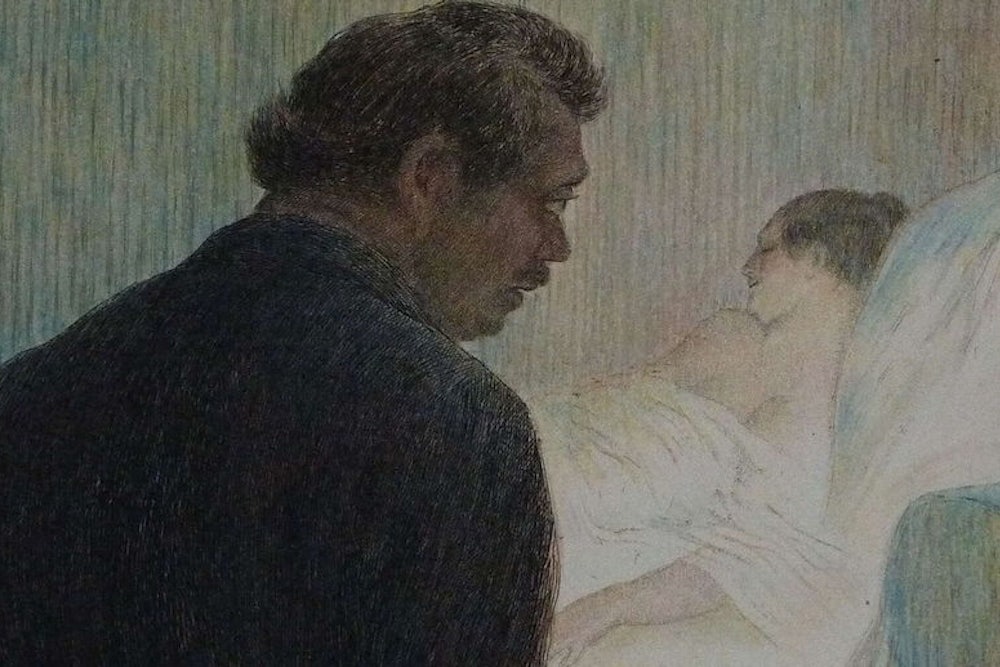"Flaubert's Enigma"
February 15, 1954
There is probably no modern writer who is more talked about and less well-known than Gustave Flaubert. It is general believed, for example, that Flaubert wrote Madame Bovary with a deep distaste for its contemporary subject, and that it was only the advice of friends that persuaded him to discipline his Romantic temperament to grapple with a realistic theme. Yet Flaubert’s early writings, not yet published when this story gained currency, show that he had tried his hand at all forms of writing and had composed an entire novel about student-life in Paris without advice from anybody.
Similarly, it is accepted as gospel by all writers on Flaubert, including Mr. Spencer, that he cherished a life-long and unfulfilled passion for a lady named Mme. Schlésinger; and that this aspect of his life is faithfully pictured in the Sentimental Education. Flaubert’s recently published notebooks, however, show that he shifted his picture of this relationship several times, and that he could not decide whether to have his hero conquer the lady in the novel or not. (He chose the latter alternative, and Mme. Schlésinger’s reputation has been safe ever since.) These are only two samples of the misconceptions that have prevented us from obtaining any comprehensible view of Flaubert’s life. And, more important, our distorted ideas about his life have hindered us from seeing many important elements in his novels in the proper light.
Unfortunately, Philip Spencer’s new biography of Flaubert does little to remedy this situation; his book is a thorough, accurate, and judicious resume of the enormous mass of research done on Flaubert’s life up the present time; but Mr. Spencer’s ideas are completely molded by scholars whose results he uses. There is little evidence that he has tried to think through their conclusions for himself; in the one or two places where he does so, he remains prudently non-committal. Flaubert’s nervous attack at the age of 22, he tells us, “offers no clue to his life and work.” If this is true, then the usual picture of Flaubert’s emotional development has to be radically revised. But Mr. Spencer disregards his momentary iconoclasm and blandly proceeds along the familiar lines—although his own assertion leaves him without any explanation for the change in Flaubert’s character that is supposed to have occurred at this time. Despite this critical insouciance, however, Mr. Spencer’s book is still the most reliable English presentation of the standard picture of Flaubert.
Francis Steegmuller, himself the author of a lively by highly questionable book on Flaubert (Flaubert and Madame Bovary), has made an extremely useful selection and translation of Flaubert’s letters. This is not, as the book jacket states, “the first comprehensive selection of his correspondence to appear in adequate English translation.” A similar selection was made in England several years ago, and was published in this country by the Philosophical Library. But this, of course, does not detract from the merits of Mr. Steegmuller’s volume, which is a bit more ample that its English counterpart.
Flaubert was not only one of the most important novelists of the nineteenth century but also one of the great letter-writers. Some French critics, indeed, have even suggested that his correspondence will ultimately remain his greatest work. However exaggerated this may seem, there is no doubt that a good many of Flaubert’s most attractive qualities as a human being never got into his work; or, if they did, they display themselves there far more indirectly than in his correspondence. His letters are written with great spontaneity and freedom, unlike all but a few of his works; and they faithfully reflect his passionate impetuosity, his great capacity for sympathy, his refreshing freedom from the occupational curse of the literati: pettiness and vanity.
Moreover, despite his ivory-tower reputation, Flaubert responded with honesty and acuity to the great social, literary, and cultural problems of his day, which have not yet ceased to be the problems of ours. In these letters the reader will find those trenchant critical utterances that impelled Benedetto Croce to rank Flaubert among the greatest literary critics of the nineteenth century. And he will also find those social and political comments which have recently aroused the ire of Jean-Paul Satre; and whose relevance to the contemporary scene, 100 years after they were written, can well be gauged from this indignation.
